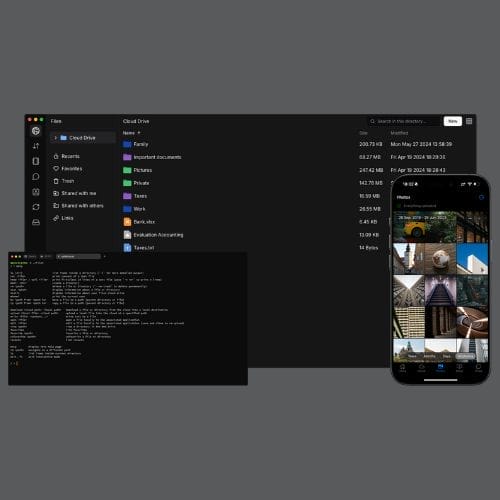Finances are an important part of any modern household. Accurately calculating and accounting for all expenses in a household budget can be challenging, especially when each family member manages their own earnings separately.
Mobile apps for managing finances can provide a simple solution for keeping a budget. They allow you to track all expenses and financial transactions in your bank accounts in detail, and help you remember to top up your credit card when needed.
What is a household budget in simple terms? A household budget is a plan that outlines the income and expenses of a household over a certain period, usually a month or a year. In simple terms, it helps you monitor the money you earn and how you spend it, allowing you to better control your finances and achieve your goals.
A family budget typically includes:
- Income: All sources of income, such as wages, pensions, social benefits, and additional earnings.
- Expenses: All spending related to daily life, such as housing (rent, utilities), food, clothing, transportation, education, medical costs, recreation, savings, and other current expenses.
Why keep a family budget?
A family budget helps you:
- Control your finances: It shows you exactly where your money is going and helps you manage it more effectively.
- Plan future expenses: You can anticipate large costs in advance, such as children’s education, home repairs, or holidays.
- Prevent debt: A budget helps you keep your spending in check so you don’t spend more than you earn, avoiding unnecessary debt.
- Save and invest: By tracking your money, you can identify opportunities to save and invest, ensuring the stability and growth of your family’s wealth. For example, using Slotozen no deposit promo codes can help you enjoy online casino games without spending your own money, giving you small ways to save while having fun.
How to allocate the family budget?
Each family chooses the approach that works best for balancing its finances. Some prefer a separate budget, while others find it more convenient to combine all income and expenses.
There are three main types of family budgeting:
- Separate
- Mixed
- Joint
Each type has its own advantages and disadvantages.
With a separate budget, each person is responsible for their own finances. This encourages a more responsible approach to spending. However, conflicts can arise when it comes to shared expenses. Not all family members may agree on how to split costs, and someone may feel upset if their contributions for shared needs significantly exceed their partner’s.
A mixed family budget offers a compromise. The family maintains a joint bank account where all income is deposited, while each member also has a personal budget for individual expenses. This approach can reduce conflicts, but the family still needs a clear system for making joint financial decisions. Misuse of funds by one member can have serious consequences, so clear rules are essential.
A joint budget is a common and straightforward method. All family income goes into a single account, from which money is allocated for shared and personal expenses. While this simplifies access to funds, it can create challenges in tracking spending and maintaining financial responsibility. Often, one family member acts as the “accountant” to monitor every transaction.
Apps for tracking family finances
Mobile apps for tracking finances provide a convenient and simple way to manage a family budget. No matter which type of budgeting a family uses, a shared account in an app allows everyone to see the overall balance.
These apps vary in features, subscription costs, and their ability to connect to online banking or other third-party services.
CoinKeeper
CoinKeeper is a convenient and user-friendly app for managing finances. Multiple users can track the family budget simultaneously, and the app offers synchronization with various banks.
CoinKeeper also provides internet banking services and issues its own card. The service is available on both smartphones and PCs, and all features can be accessed through any browser.
Toshl
Toshl works with over 200 currencies. By purchasing a subscription, you can add additional users and synchronise the app with your bank accounts. The app also offers notification settings, including reminders for loan payments, and allows you to generate detailed financial reports in PDF, Excel, or Google Docs formats.
Alzex Finance
Alzex Finance is a convenient app that helps maintain personal financial boundaries within a family. Each user can choose which expenses to keep private and which to share with other family members. The app allows you to set financial goals and track progress, as well as organise expenses by tags, dividing both personal and family budgets into large categories, subcategories, or even individual transactions.
Zen Money
Zen Money lets you track money flows in multiple currencies. It is a multi-user app, so all family members can easily connect and monitor the current balance together. The app offers synchronisation with banking apps and automatic updates to your family budget. Clear and convenient graphs help you track main expenses and identify the most costly months. Some features are available only with a subscription.
How to manage your family budget correctly
Every detail matters when it comes to family finances. By following a few simple rules, you can track money movement in detail and improve your financial situation over time.
Set up a personal schedule for managing finances
Decide on a routine that works for you. Some people prefer daily updates, while others conduct a full audit of receipts and card expenses at the end of the week. The key is to stick to your schedule so that managing family finances becomes systematic. Even if you miss a day, two days, or even ten, continue tracking your money. You may not recover every transaction, but reviewing most of your finances in detail is still highly valuable.
Track small purchases as carefully as large ones
Even minor expenses matter. Coffee from a kiosk or a trolleybus ticket may seem insignificant, but by the end of the month, these small items can add up and take a large portion of your budget.
Make your financial reports as detailed as possible
Record every penny. Detailed reports help you understand exactly where your money goes, preventing surprises at the end of the month and avoiding untracked losses that could add up to hundreds or even thousands of dollars.
Record your savings
Track the money you save to avoid constantly counting your cash or checking your deposit account. Set aside funds for unexpected expenses or future investments, ensuring financial stability for your family.
A family budget is essential in today’s world. Tracking your finances helps you organise family matters, identify key expenses, eliminate unnecessary spending, and prevent constant money shortages.
Experience shows that people who manage their finances wisely can achieve a lot even on a low income. They can also set aside money for investments, which may later be used for education or starting a small family business.




